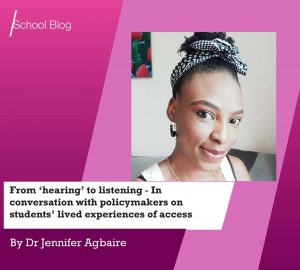 Blog post by Dr Jennifer Jomafuvwe Agbaire , Research Associate at the School of Education, University of Bristol
Blog post by Dr Jennifer Jomafuvwe Agbaire , Research Associate at the School of Education, University of Bristol
“Those young students can just talk anyhow. If you really want to know about university admission in Nigeria, ask those in charge.” Just before I set out to begin my doctoral research, I got strong forms of this proposition from colleagues.
It was not surprising that previous research on the topic scarcely included students.
Fast-forward to several years and a PhD award later, I was organising an ESRC-funded exploratory impact event to share my doctoral research findings from students with ‘those in charge’. Yes indeed, I had defied the popular convention and gone ahead to explore Nigeria’s university access system through the lived experiences of students who are subjected to it.





